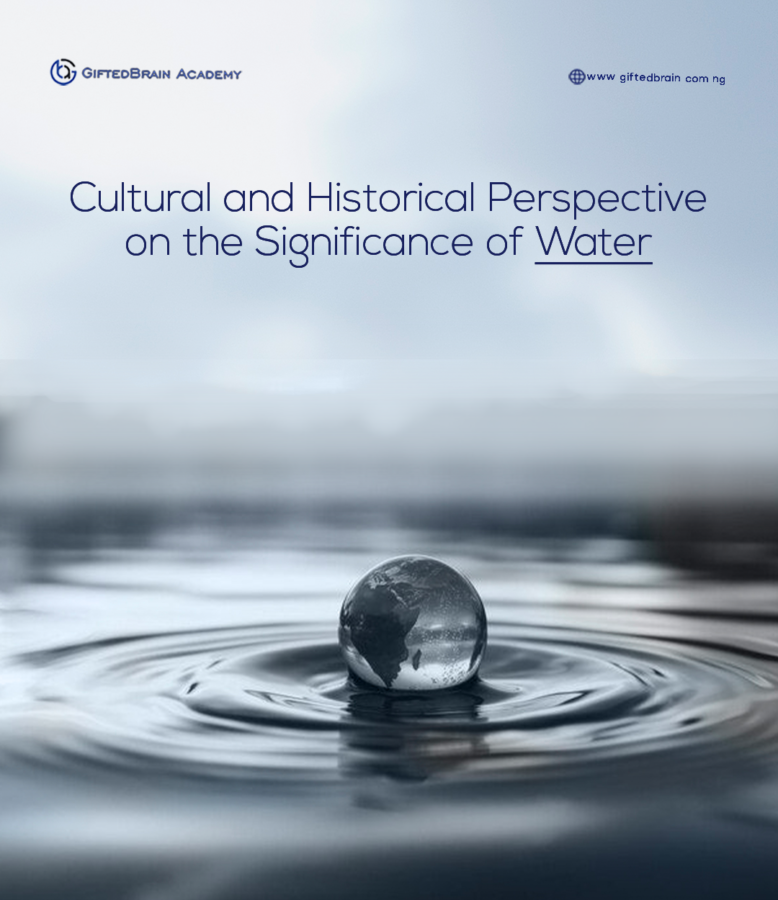As we all know, “water” is a source of life. But do you know there is more to water than we visualize it to be?
Do you know this valuable resource is therapeutic for overall health?
In today’s life, how can you rate the effectiveness of water generally?
Don’t look further, In this article we’ll be stating the obvious about water, its significance, benefits, challenges, and solutions.
What is water?
Water is an odorless, transparent, tasteless, and nearly colorless substance. It is essential for all known forms of life. As nature has it, water emerged from the creation of the universe (world), but science defines water as a chemical substance composed of two hydrogen atoms bound to one oxygen atom (H2O) serving as a solvent for many substances, a medium for chemical reactions, and a crucial component of biological processes.

Additionally, valuable resources exist in various states including; solid(ice), liquid, and gas(water vapor). Also, it also covers approximately 71% of the Earth’s surface in the form of oceans, lakes, glaciers, and rivers, It plays a critical role in regulating the Earth’s climate, supporting the ecosystem, and sustaining human societies.
Cultural and historical perspective of water
The history of water spans billions of years ago, from its formation during the early stages of the universe to its critical role in the emergence and substance of life on Earth. This resource is revered as a symbol of purity, renewal, and spiritual cleansing in various religious traditions and has been central to rituals and ceremonies marking important life events and festivals.
Secondly, its flowing nature also symbolizes life’s continuous journey and the cyclical nature of existence. In many communities, particularly those reliant on fishing, maritime trade, or agriculture, water is not only a vital resource but also a source of livelihood and cultural identity. Water bodies such as rivers, lakes, and oceans often serve as important gathering spaces for communities, providing opportunities for socialization, cultural events, recreation, and fostering a sense of belonging, in other terms water is known as “Aqua vitae” (water of life).
Overall, water’s cultural significance is multifaceted and deeply rooted in human history, spirituality, and identity. It shapes beliefs, traditions, and cultural practices and continues to play a central role in shaping the cultural landscape of societies around the world. Now, let’s talk about the benefits of aqua vitae(water).
Benefits of Water
The benefits of water are very broad but these are the 8 key elements of its usefulness.
- Improve sleep quality: Proper intake of the required amount of water daily is important to promote good sleep quality. You can learn about the psychology of sleep and its benefits on the brain here.
- Reduce stress: Drinking water can help mitigate the physiological effects of stress by supporting proper hormone regulation and promoting relaxation.
- Energy level: Drinking water helps maintain your energy level and combat fatigue by supporting proper circulation and oxygen delivery to cells.
- Mood regulation: Drinking water regularly helps stabilize mood and improve overall mental and emotional resilience. We have talked about ways to protect your mental health in one of our previous posts.
- Joint lubrication: Proper hydration can alleviate joint pain, and stiffness, reduce friction, and cushioning impact during physical activities.
- Nutrient transport: Aqua vitae serves as a medium for transporting nutrients and oxygen to cells throughout the body.
- Detoxification: Staying hydrated helps the body eliminate toxins and maintain overall health.
- Hydration/skin health: Staying hydrated is essential for regulating body temperature, and digestion, supporting various physiological functions.

Science has consistently shown that proper hydration is essential for maintaining overall health and well-being. They have linked adequate water intake to improved cognitive function, mood regulation, kidney health, digestion, and physical performance. Conversely, dehydration can lead to cognitive impairment, fatigue, and increased risk of various health problems.
However, when you maintain proper hydration levels longevity and overall quality of life are certain. Drinking water supports the body’s natural processes and helps prevent dehydration-related health issues, contributing to a longer and healthier lifespan.
With all being noted, do you know there are some challenges related to water that affect livelihood and overall health?
Water Challenges and Solutions

The challenges related to water are numerous and diverse, as populations have grown and water resources have become increasingly strained, issues of water pollution, scarcity, and competition have emerged. In some regions, disputes over water rights and access have led to conflicts and geopolitical tensions. During this crisis, the means people used to facilitate water was complex and weak governance, until the 19th and 20th centuries when technological advancement led to the construction of large-scale water infrastructure projects. The project provided reliable access to aqua vitae for the growing urban and rural populations and supported industrialization and economic development.
However, as the understanding of the link between aqua vitae and public health evolved, it was discovered that its challenges are as old as human civilization itself, with societies grappling with various issues related to scarcity, pollution, water eruption, and management for millennia.
Here are major challenges including;
- Pollution
- Illegal extraction and theft
- Deteriorating infrastructures
- Climate change impacts
- Inadequate governance
- Competition over resources
- Scarcity
Overall, there are ways these challenges can be overseen and rectified. It requires a multifaceted approach that combines policy interventions, community engagement, technology innovation, and sustainable management practices. Here are some key solutions to the challenges. They include;
solutions to water challenges
- Promotion of Indigenous and Traditional Knowledge: Incorporating and recognizing Indigenous and traditional systems into water management practices can offer valuable insights for addressing its challenges.
- Ecosystem restoration and conservation: Restoring degraded habitats, reducing pollution, and conserving critical watersheds can strengthen ecosystem service and resilience to environmental changes, benefiting both people and nature.
- Promote recycling and reuse: By implementing water recycling and reuse programs technologies such as greywater recycling, rainwater harvesting, irrigation, and industrial processes can reduce pressure on freshwater sources and minimize wastewater discharge to maximize the use of limited water sources in urban areas.
- Governance reforms: Promoting inclusive decision-making processes, empowering local communities, and fostering cooperation among stakeholders are essential for addressing water challenges effectively.
- Public awareness and behavior change: Education, campaigns, community-based programs, and public outreach initiatives can promote behavior changes and foster a culture of water stewardship.
- International cooperation and partnership: Through collaborative initiative, diplomatic negotiations, and joint monitoring efforts can foster trust, cooperation, and mutual benefits among riparian countries sharing transboundary rivers, aquifers, and lakes.
Conclusion
In essence, water is one essential commodity that we can’t do without as a whole because without it there is no life. Its effectiveness is highly rated in the universe as it is therapeutic to the brain, mind and body. Note that it’s part of the Sustainable Development Goals(SDGs) recognizing this resource as a valuable part of human rights, ensuring equitable access, thereby leaving no one behind.
Lessons from history can inform contemporary efforts to address current aqua vitae(water) challenges, save water, and foster overall health and livelihood.

Hope this article was helpful. Do more good by sharing this wonderful information with your loved ones and the world at large. Together we can save lives by saving water always.👍
Don’t forget to drop your suggestions, impacts, and questions in the comment section.


